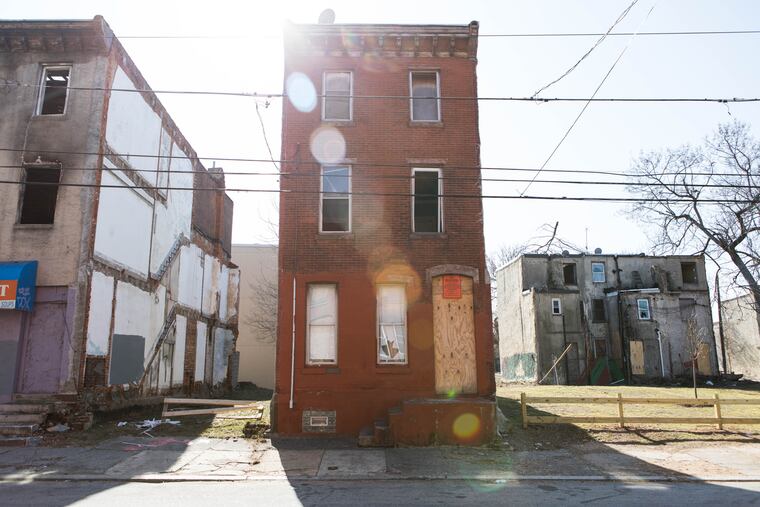Hope for systemic change in how Philadelphia addresses poverty | Editorial
Despite Philly's being the poorest big city in America, recent developments to help renters provide a rare cause for optimism.

For decades, city leaders have been promising to end poverty — or at least dramatically reduce it. And yet, about one in four Philadelphia residents lives in poverty, earning us the unenviable distinction of being the “poorest large city in America.”
But recent developments should give Philadelphians hope for a more equitable future.
It would be a fool’s errand to believe that any one program, or even one administration, could immediately reverse a problem rooted in decades of disinvestment, racism, and failed policies at all levels of government.
In Philadelphia, something as straightforward as raising revenue is complicated by rules imposed by the state. The city can’t raise its own minimum wage or tax commercial properties at a different rate than residential properties. Resources from Harrisburg or Washington, D.C., are scarce. The occasional windfall, such as COVID-19 relief funds, is temporary.
All of these factors combined can lead to immense cynicism and the belief that government just can’t deliver on any promises to people who need support. But there might be a few reasons to believe that Philadelphia is beginning to chart a different course on how it is addressing poverty.
Despite an array of crises — most notably the COVID-19 pandemic, gun violence, and overdose deaths — there are ways that Philadelphia shows signs that it is beginning to address some of the most intractable drivers of poverty.
» READ MORE: Rental assistance is a lifeline for thousands of Philadelphia families — don’t let it disappear | Opinion
For example, since the start of the pandemic, Philadelphia established one of the most effective rental assistance distribution programs in the country. While many cities and states — including Pennsylvania — failed to get money to tenants and landlords, in Philadelphia, the money seemingly couldn’t move fast enough.
Now, Philadelphia has developed a way to distribute funds quickly whenever they become available — and that’s a big deal. The rental assistance program also represented a positive philosophical shift in who gets funds. The city determined that many tenants can’t benefit from the program because their landlords didn’t agree to participate. So the rental assistance program started giving assistance directly to tenants.
In the coming months, the city is expected to start two different guaranteed-income pilots, in which eligible individuals will receive a recurring amount of money for expenses. The idea was first announced in early 2020, when City Council announced a poverty action plan.
The trend toward giving assistance directly to those in need represents a shift in thinking. Instead of complex programs providing goods and services to people, Philadelphia is moving toward direct assistance in the form of cash. That is an empowering, non-paternalistic approach.
The challenge with these programs is funding them. Rental assistance dollars dried up and Philadelphia stopped accepting applications in early January. It’s good that Philadelphia is getting comfortable with direct assistance, but implementing systemic changes is just as important.
That’s why another exciting change in Philadelphia is seeing city officials find ways to overhaul systems that produce negative results. The Philadelphia Eviction Diversion Program, which has been extended by Council through 2022, is a prime example. It is a way to rethink how disputes between landlords and tenants are handled and to empower both parties to work toward solutions. The experience, hopefully, leaves both landlord and tenant better positioned to resolve future disputes — and more knowledgeable about available resources.
» READ MORE: Low-income tenants facing eviction can now get free legal representation in 2 Philly zip codes
One more promising development: This year, Philadelphia finally started to implement a Right to Counsel ordinance that City Council passed in 2019. In two zip codes, low-income tenants facing eviction will be given a lawyer to represent them in court — something tenants rarely have and landlords nearly always do.
City Councilmember Helen Gym, who championed both the Right to Counsel and the diversion programs, told this board that through these efforts, “we are showing that there is a critical role that government plays when we are meeting the needs of people.”
That’s huge — and, sadly, rare in Philadelphia.
If Philadelphia continues to move toward responding directly to the needs of individuals and continues thinking of ways to reshape systems in a more equitable manner that balances power, there is hope for long-lasting, meaningful change. Add to that a Congress that is able to extend the child tax credit and pass investments such as Build Back Better, and Philadelphia just might find itself taking the first steps on a new path.